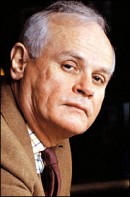 The four collections of Paris Review interviews published by Picador in recent years are beautiful books worth owning. (I wrote about the series and the fourth volume here. Oh, and actually wrote about earlier volumes at another venue, here and here and here.) Now, as part of new editor Lorin Stein’s regime, all of the Review’s interviews are available online.
The four collections of Paris Review interviews published by Picador in recent years are beautiful books worth owning. (I wrote about the series and the fourth volume here. Oh, and actually wrote about earlier volumes at another venue, here and here and here.) Now, as part of new editor Lorin Stein’s regime, all of the Review’s interviews are available online.
Browsing through the subjects by last name, I get the distinct sense that I’ll be losing many, many hours to this archive, though the negative connotations of “losing” are not at all apt here. Just three that I will be diving into soon: Michiko Kakutani (and the magazine’s editors) interviewing Woody Allen. John Sullivan talking to Guy Davenport. And George Plimpton and the great John Gregory Dunne (pictured above), who waste no time getting started, beginning like this:
Plimpton: Your work is populated with the most extraordinary grotesqueries—nutty nuns, midgets, whores of the most breathtaking abilities and appetites. Do you know all these characters?
Dunne: Certainly I knew the nuns. You couldn’t go to a parochial school in the 1940s and not know them. They were like concentration-camp guards. They all seemed to have rulers and they hit you across the knuckles with them. The joke at St. Joseph’s Cathedral School in Hartford, Connecticut, where I grew up, was that the nuns would hit you until you bled and then hit you for bleeding. Having said that, I should also say they were great teachers. As a matter of fact, the best of my formal education came from the nuns at St. Joseph’s and from the monks at Portsmouth Priory, a Benedictine boarding school in Rhode Island where I spent my junior and senior years of high school. The nuns taught me basic reading, writing, and arithmetic; the monks taught me how to think, how to question, even to question Catholicism in order to better understand it. The nuns and the monks were far more valuable to me than my four years at Princeton. I’m not a practicing Catholic, but one thing you never lose from a Catholic education is a sense of sin and the conviction that the taint on the human condition is the natural order.

